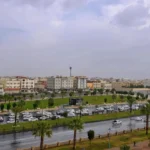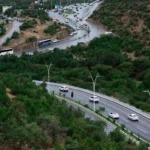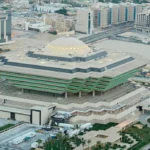The delivery sector in the Kingdom recorded significant growth during the third quarter of 2025, with the total number of completed orders exceeding 103 million transactions across the Kingdom’s regions, representing a 40% increase compared to the same quarter in 2024.
Riyadh region accounted for 42.9% of total orders
Data revealed that Riyadh region led all cities in terms of completed orders with 42.96%, followed by Makkah region with 22.42%, then the Eastern region with 15.77%, while orders in Madinah region reached 4.91%, and Asir region 4.07%.
The percentage in Qassim region was approximately 2.82%, followed by Tabuk region with 1.84%, Hail region with 1.73%, Jazan region with 1.18%, while Al-Jouf region recorded 0.74% followed by Najran region with 0.69%, Northern Borders region with 0.55%, and finally Al-Baha region with 0.27%.
The increase was attributed to shifts in consumer behavior, with growing reliance on e-commerce contributing to higher demand for delivery services, in addition to investments in modern technical solutions that enhanced response speed and increased competitiveness within the market.
This notable growth in the delivery sector is due to several factors, most notably the development of systems and regulations that enabled companies to improve their service quality and operational efficiency, along with enhanced digital infrastructure and support for innovation in logistics services.
Riyadh
Riyadh is the capital and largest city of Saudi Arabia, serving as the political and administrative center of the nation. Historically a walled oasis town, it was the ancestral home of the Al Saud dynasty and became the capital in 1932 after the unification of the country. The city has since undergone rapid modernization, transforming from a traditional desert settlement into a bustling, contemporary metropolis.
Makkah
Makkah is the holiest city in Islam, located in Saudi Arabia. It was the birthplace of the Prophet Muhammad and is the site of the Kaaba, the most sacred shrine in Islam, which Muslims believe was built by Abraham and his son Ishmael. Every year, millions of Muslims perform the Hajj pilgrimage to Makkah, a religious duty that must be carried out at least once in their lifetime.
Eastern region
The Eastern region of Saudi Arabia is a historically significant area located along the Persian Gulf. It is home to the vast oil fields that transformed the nation’s economy and contains the UNESCO World Heritage Site of Al-Ahsa Oasis, one of the world’s largest oases with a history of continuous human habitation dating back to the Neolithic period.
Madinah
Madinah, also known as Medina, is a city in Saudi Arabia of profound religious significance in Islam. It was the destination of the Prophet Muhammad’s migration (Hijrah) in 622 CE and served as the capital of the first Muslim community. It is home to Al-Masjid an-Nabawi (The Prophet’s Mosque), which contains his tomb, making it one of the two holiest cities in Islam.
Asir
Asir is a mountainous region in southwestern Saudi Arabia known for its lush green landscapes and unique cultural heritage. Historically, it was an independent region known for its tribal societies and distinctive architecture, including fortified mountain villages. Today, it is celebrated for its traditional festivals, terraced agriculture, and as a popular summer destination for its cool climate.
Qassim
Qassim is a central region of Saudi Arabia, historically known as its agricultural heartland due to its vast oasis and fertile soil. It holds cultural significance as a traditional crossroads for trade and pilgrimage routes across the Arabian Peninsula. The region’s history is deeply tied to the early Saudi states, and it is famous for its date production and traditional Najdi architecture.
Tabuk
Tabuk is a city in northwestern Saudi Arabia with a history dating back to the pre-Islamic era, known for its mention in the Quran regarding the Expedition of Tabuk led by the Prophet Muhammad. It is a significant agricultural center in the region, benefiting from fertile land and water resources. Today, the area is also developing as a tourist destination, featuring historical sites like the Tabuk Castle and its proximity to the ancient Nabatean ruins at Al-Bida.
Hail
Hail is a city in northern Saudi Arabia with a history dating back thousands of years, evidenced by ancient rock art and inscriptions in the surrounding desert. It served as a historic capital for the Arabian Peninsula’s powerful Al Rashid dynasty in the 19th century. The region is also famous in Arab folklore as the traditional homeland of the poets and knights of the Banu Tayy tribe.






